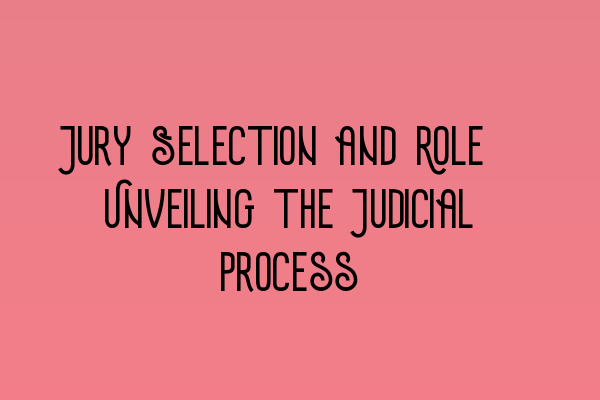Jury Selection and Role: Unveiling the Judicial Process
When it comes to criminal trials, one of the most critical elements is the selection and role of the jury. The jury plays a pivotal role in determining the fate of the accused, as its members are responsible for evaluating the evidence presented and ultimately reaching a verdict. In this blog post, we will delve into the intricacies of jury selection and shed light on the significant role they play in the judicial process.
The Jury Selection Process
The jury selection process, also known as voir dire, is a crucial step that ensures a fair trial. It involves carefully choosing individuals from a pool of potential jurors who will offer an unbiased and impartial judgment. The selection process involves several stages, such as:
- Creating a jury pool: The jury pool comprises individuals who are eligible to serve as jurors. These individuals are typically randomly selected from the community.
- Questioning potential jurors: Attorneys from both the defense and prosecution have the opportunity to question potential jurors to identify any biases or prejudices that may impact their ability to render an impartial verdict. This process helps narrow down the pool to individuals who can provide a fair judgment based on the evidence presented.
- Challenges for cause: Attorneys can challenge potential jurors if they believe there is a valid reason for disqualifying them due to biases or conflicts of interest. The judge decides whether to accept or reject the challenge.
- Peremptory challenges: Each side is usually granted a limited number of peremptory challenges, which allow them to dismiss potential jurors without disclosing any reason. These challenges can be made to eliminate individuals who may seem unfavorable or inclined towards a particular outcome.
- Finalizing the jury: Once both sides have exhausted their challenges, the remaining individuals form the final jury that will hear the case.
It is important to note that the jury selection process aims to create a diverse and representative jury that reflects the community in which the trial takes place. This ensures a fair and unbiased trial for all parties involved.
The Role of the Jury
Once the jury has been selected, its members have a crucial role to play in the judicial process. The primary responsibilities of the jury include:
- Listening to evidence: The jury must carefully listen to the evidence presented by both the defense and the prosecution. This includes witness testimonies, expert opinions, and any exhibits or documents that are submitted.
- Evaluating the evidence: After hearing all the evidence, the jury must evaluate its credibility and weigh its significance in the context of the case. This involves analyzing the strengths and weaknesses of each piece of evidence and assessing its reliability.
- Deliberating: Once the trial concludes, the jury retires to the jury room to deliberate on the evidence presented. During deliberations, the jurors discuss the case, exchange perspectives, and collaborate in reaching a unanimous verdict.
- Reaching a verdict: The jury’s ultimate responsibility is to reach a verdict based on the evidence presented and the instructions provided by the judge. The verdict can be “guilty” or “not guilty,” and it must be reached unanimously, except in cases where a unanimous decision is not required.
The jury’s role in the judicial process cannot be underestimated. They act as the voice of the community and ensure that justice is served in a fair and impartial manner.
To prepare for the SQE exams, it is essential to have a thorough understanding of the judicial process and the role of the jury. Familiarizing yourself with legal concepts and procedures can significantly enhance your chances of success. Consider taking SQE 1 and SQE 2 preparation courses to deepen your knowledge and improve your performance on the exams.
For additional practice and to test your understanding of criminal law, you can explore SQE 1 practice exam questions and SQE 1 practice mocks FLK1 FLK2. These resources will help you gauge your progress and identify areas that require further attention.
Stay up to date with the latest developments in the field of criminal law and the SQE exams by regularly checking the SRA SQE exam dates. Being aware of important dates and deadlines will help you plan your studies effectively and stay on track towards achieving your professional goals.
In conclusion, jury selection and their role in the judicial process are vital components of criminal trials. The fair selection and impartial judgment of jurors ensure that justice is served. As future legal professionals, it is crucial to familiarize ourselves with these processes and continually enhance our understanding of the legal system.
